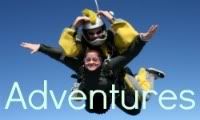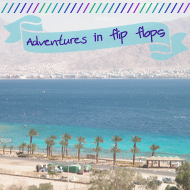I love to travel. I love to explore far-off lands, and shop in markets with names I cannot pronounce. I love to climb mountains I've never heard of, and do things that scare me at first and thrill me later. And I love to do it cheaply!
I don't know if you've been able to tell, but I've been traveling the past few weeks. I've been in Washington, D.C., New York City, and Israel! Sorry for not disclosing that earlier, but, you can never be to careful! As of this moment, I'm navigating airports and coming home. I promise to share my journey with all of you (and to post my first-ever giveaway with goodies from my trip!), but today I want to talk about how I save money when I travel.
This trip was cheap, and I am very lucky that I was able to take advantage of frequent flyer miles and the Birthright Israel program. Even if you can't use these programs, you can still save money and go to great places! When I studied abroad in Fiji and Australia for 6 weeks (5 weeks + 1 week independent travel), I took exactly $1000 spending money with me, and that included my meals, whitewater rafting, bungee jumping, SCUBA diving, souvenirs, the Sydney Bridge climb, and 5 nights by myself that I had to pay for lodging (and those fancy activities are expensive and DO NOT come with coupons). Here's how I do it:
1. Don't stay in hotels!: They are expensive! When I travel, I camp (Disney World is great for this by the way) or stay in hostels. Don't be scared by that word! I had a fantastic experience at Wake Up! in Sydney (I had a LOT of great experiences in Australia-if you're going let me know, I can make some fantastic recommendations!), for example, and 5 nights cost me $100 TOTAL. They often have private rooms with double beds at great rates (a good resource for these is Hostels International; some countries, like Australia have their own hostel network where you can book and pay at one hostel and stay at another) and many accept kids. If these aren't options for you, consider staying with friends, or renting a house or apartment. People often rent out their apartments while their on vacation for awesome rates, and then you can cook for yourself. Just don't forget to treat your hosts to a nice dinner, or bring a host/ess gift.
2. Cook for yourself. It's not as much fun as eating out every night, for sure, but it's far cheaper. Hostels often have communal kitchens that you can use, and people are generally courteous about not eating your food and cleaning up after themselves. When in Australia, I made coffee for myself in the mornings, and toted around some PB and bread, pasta and sauce, and cereal and milk. Doesn't sound too exciting, but I ate out every once in awhile and spent WAY less than most of my peers. And, it was kind of cool to be in a foreign grocery store and see all of the differences. We are spoiled Stateside, I tell you! And, just because I survived on PB sandwiches doesn't mean that you can't make soups, stews, salads, gourmet sandwiches, etc. I was just lazy =).
3. Carry your own snacks. For the first part of my trip, I carried apples and a big bag of my Nutty Maple Granola everywhere. For abroad I had Luna bars. It's so easy to stop and snack all the time, especially when you LOVE street vendor food as much as I do. Of course, you can always eat that if you want to (what is Israel without falafel, or Paris without a Croque Monsieur or a Crepe from a street vendor?), but it's nice to not have to rely on buying snacks all the time.
4. Bring a Nalgene: It goes without saying that bottled water is expensive. You might not always be able to do this because of water quality (I wasn't in Fiji), but in the U.S., Europe, Australia, Canada, etc. you can drink the tap water. Just remember to empty it out before you head through airport security (during one memorable trip I was running late and the nice security lady let me dump the water in a plant!).
5. Know what you want to do and see if there are special rates on some days: When I went bungee jumping, I made a spur-of-the-moment decision. Later I found out that jumps were buy one, get one free the day after I went. I could have gone twice if Id've paid attention! Another example, when I did the Sydney Bridge Climb, I wanted to go at night so that I could see the Sydney Opera House lit up. Unfortunately, it was significantly more expensive. You know what wasn't? A twilight climb. Go up right at dusk, get the same at-night view, pay less money. Score!
6. Find souvenirs that you can use and at local markets: I love souvenirs. I love that I have reminders of my trips around me. But, I do not need a bunch of tchatchkes (junk), either. So, before I go on a trip, I take note of everything I'm looking for, whether that be pciture frames, something for my kitchen, new jewelry, or a book, and I look for those things when I'm traveling. My current journal is from Australia, my favorite earrings are from Fiji, and my warmest hats are from Washington, D.C.
7. If you fly, use miles, rewards, MyPoints, and Swagbucks: This is self-explanatory, but it's a good idea. I got a free flight out of American Advantage (thanks Aunt Cindy!). Don't forget to ask for AAA discounts, either. Also, as the kid of a travel agent (and someone who has worked in tourism) pick off-season times. In the U.S. for example, peak times are holidays and any time that school isn't in session (summer, spring break, etc.). This is hard if you have kids, but let me tell you, off-peak times at Disney World are practically barren, and you can get some fantastic deals (free food for your entire stay, for example). A good travel agent or google search should be able to let you in on some good dates to travel.
8. Pack light & borrow luggage: You see that backpack I'm wearing on my "About Me" page (the bungee jumping pictures are there too)? Not mine. My trips tend to be flighty: that is, I jump from one thing to another to another to another. Rolling suitcases can be bad for walking through cities and jumping from hostel to hostel. If you don't have luggage to fit your needs, find someone who does! I found that I loved this backpack so much that I'm going to buy it from it's owner for a very good price for an adventure I'm hoping to have after graduation.
9. Be choosy: Don't let traveling be an excuse to buy whatever you want, eat whatever you want, go whereever you want. Yes, you're there to have fun, and have an adventure, but a little bit of legwork goes a loooong way. For example, when I studied abroad, I had the options to go whitewater rafting, bungee jumping, skydiving, SCUBA diving, rapalling, do the bridge climb, etc. There were many different packages available for each of these activities, and I had to make some tough choices (I would have loved to go rock climbing and rapalling in the Blue Mountains, for example, but the Bridge Climb was calling my name; so I settled for a $20 day-long hiking tour of the mountains to compensate for the expensive Bridge Climb).
10. Use your camera to your advantage: Pictures make the BEST souvenirs. I took over 1500 pictures on my study abroad, and had them made into a photo book for about $25 + shipping. I'm sure I could've gotten it cheaper if I would have been savvy, but I still think it's a bargain considering how much fun I had on that trip. I prefer to spend money on experiences rather than stuff so pictures are great to capture those experiences.
So, how do you save money when you travel? Are you ready to plan your next trip?
Monday, March 21, 2011
Subscribe to:
Post Comments (Atom)






















Fantastic tips, and sounds like you've had amazing adventures! Thank you for sharing!
ReplyDelete@Penny: You're welcome! I'll be sharing more once I've gotten some sleep, including a Mondey-Saving Monday post on how to haggle at places like flea-markets and such!
ReplyDelete